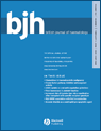The presence of IFNG 3/3 genotype in the recipient associates with increased risk for Epstein–Barr virus reactivation after allogeneic haematopoietic stem cell transplantation
Summary
Recent studies have shown that interferon-γ gene (IFNG) polymorphism constitutes a risk factor for acute and chronic graft-versus-host disease (GvHD) after allogeneic haematopoietic stem cell transplantation (HSCT). Patients with IFNG 3/3 have been found to be more prone to GvHD. This rather puzzling result, as 3/3 genotype is associated with a decreased IFN-γ production, was investigated in the present study in the context of Epstein–Barr virus (EBV) reactivation. Microsatellite polymorphism (CA)n within the first intron of IFNG gene was assessed in 83 HSCT recipients and related to EBV load. Quantification of EBV copies was performed by a real-time polymerase chain reaction in peripheral blood cells taken from the patients 2–3 months after HSCT. It was found, that patients having IFNG 3/3 genotype presented with a high number of EBV copies (over 10/105 blood cells) when compared with the recipients with other IFNG genotypes (10/14 vs. 17/69, P < 0·001). This association was independent of recipient's age, underlying disease, conditioning regimen, type of donor, source of stem cells or pretransplant donor and recipient EBV serological status. Thus IFNG 3/3 genotype, known to be associated with a decreased IFN-γ production, appeared as a factor significantly contributing to the risk of EBV reactivation after allogeneic HSCT.




